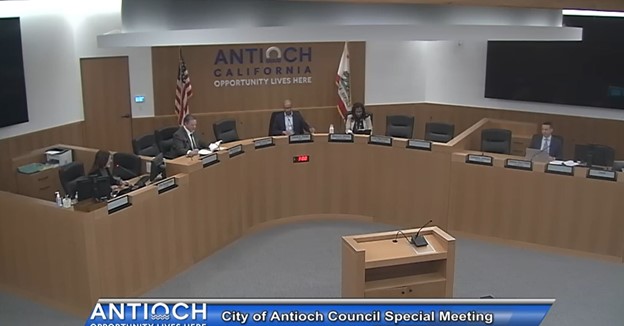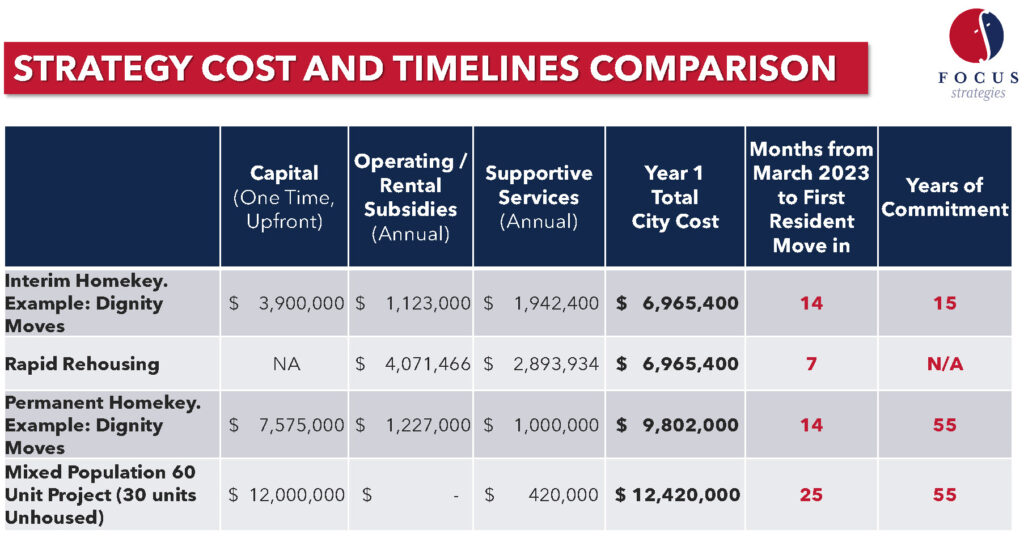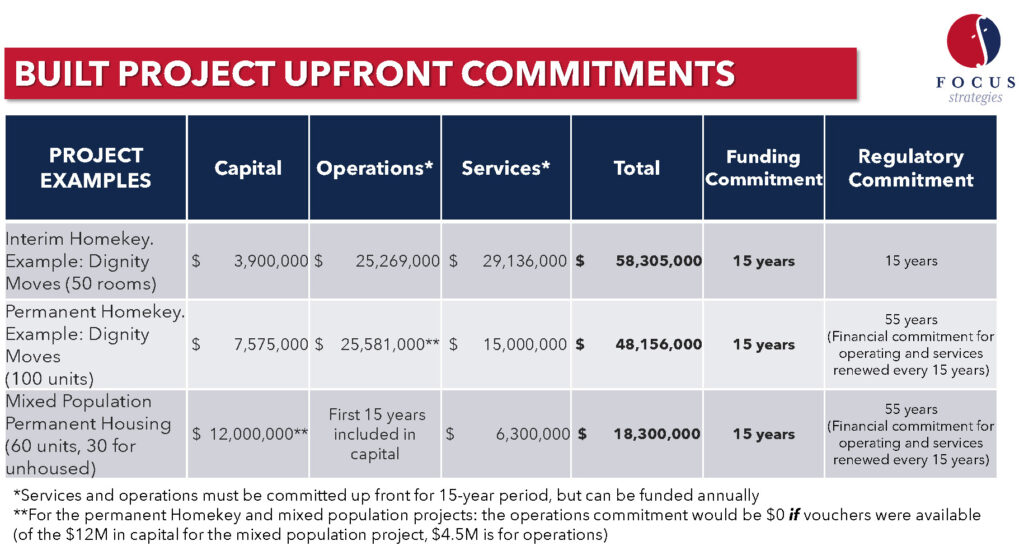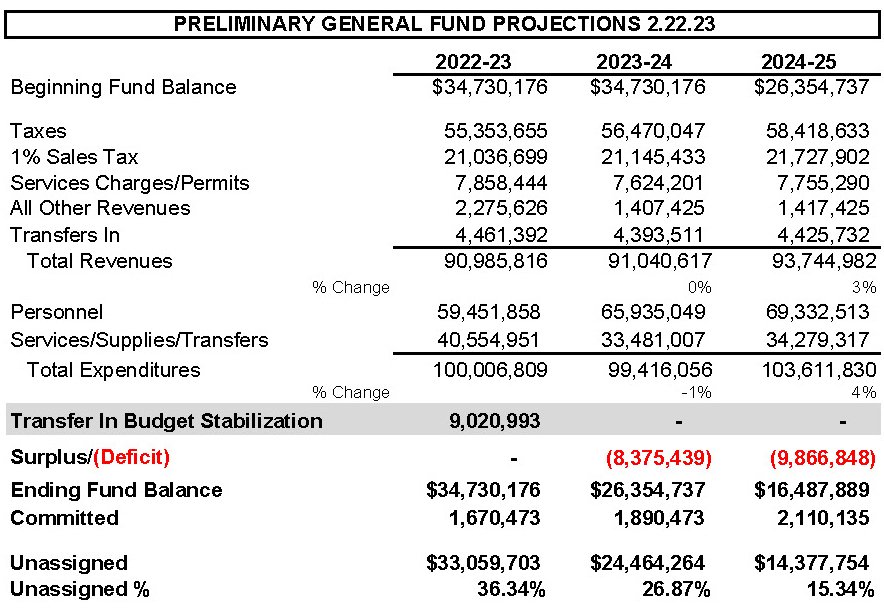Antioch Council gets bad news on homeless program funding, proposed urgency ordinance to ban liquor stores dies

With only four council members in attendance, no action was taken on either item during their special meeting on Thursday, Feb. 23, 2023. Video screenshot
City facing $8-$10 million annual deficits over next two years; ordinance required 4/5ths vote but only garnered two, ban can return for future council meeting agenda
‘Even if it’s spread out over 15 years if it’s $5 or 6 million per year I don’t know where the funds would come from if it doesn’t come from grants” – City Finance Director Dawn Merchant
By Allen D. Payton
With District 3 Councilwoman Lori Ogorchock participating via Zoom and Mayor Pro Tem and District 1 Councilwoman Tamisha Torres-Walker and City Manager Con Johnson absent, the Antioch City Council held a special meeting Thursday but was unable to accomplish anything. They discussed four options to help the homeless but could not reach consensus on the desired direction after hearing the city budget doesn’t have the funds. In addition, a proposed 45-day urgency ordinance banning new liquor stores in the city to give staff time to develop an ordinance permanently banning them failed with only the proponent, District 4 Councilwoman Monica Wilson and Mayor Lamar Thorpe supporting it. That required three votes to move forward and if it returned to a future council agenda for a vote, it would have required a four-fifths, super majority vote of council members to approve. But both Ogorchock and District 2 Councilman Mike Barbanica opposed a ban.

Source: Focused Strategies
Homeless Program Options
Megan Kurtaff-Schatz, President of Focused Strategies, the city’s consultant on homeless issues, provided the presentation to the council members of an overview on strategies for them to choose from to “serve and house” homeless residents in Antioch. Unhoused Strategies presentation ACC022323
A graph in the presentation states, “Interim Housing does not decrease the unhoused population. Individuals living in temporary shelter (interim housing) are still individuals experiencing homeless.”
“What reduces homelessness is having housing available,” she said.
The charts show a current population of 475 unhoused residents in Antioch.
Kurtaff-Schatz presented three options, including Non-Congregate Bridge Housing (Interim Housing), Rapid Rehousing (rental subsidies in market housing) and Permanent Supportive Housing (Built Units). The Interim Housing choice would still result in a growing homeless population. But it would decrease with the latter two options.
Depending on the option chosen it will take between seven to 25 months to implement and the City’s commitment would last from 15 to 55 years, and Year 1 costs would be between $7 million to $12.42 million.

Source: Focus Strategies
The Built Project Upfront Commitments slide shows a total of $18.3 million to $55.3 million the city would have to make for the 15-year life of the program.
City Finance Director Dawn Merchant showed a preliminary budget for Fiscal Year 2022-23 that includes a transfer in of $9 million from the City’s Budget Stabilization Fund to cover the deficit. But the chart shows deficits of about $8.4 million in FY 2023-24 and $9.9 million in FY 2024-25.
Even with budget cuts, “we’re not going to get anywhere near zero,” she said.
“The only source of funding for any of these projects is the City’s General Fund. If we stay at the $8 to $9 million deficits, that’s pretty much going to eat up the Budget Stabilization Fund,” Merchant added.

Source: City of Antioch
Public Upset, Loses Hope on Homeless Programs
Homeless advocate and Antioch resident Andrew Becker said, “It’s concerning to me…that at the last council meeting it was clearly stated by Dignity Moves that there were other alternatives outside of the RFP process. Do you know what their response was? Nothing. I talked to Dignity Moves, yesterday and they were frankly insulted. And they’re not here, tonight and Focus Strategies is here.”
So, frankly as an advocate of who are not statistics…what are we doing here?” he asked becoming quite emotional “Terri House handles our housing grants and she’s not even here. Where is she?”
Another man spoke saying, “I was excited before. Now, I’m not excited. I’m very concerned after hearing…about the money coming from the city funds. Quite frankly, this needs to be a regional approach. Cities like Brentwood and Oakley need to provide funding for this. I don’t know where I stand with this anymore. I feel like I’ve lost hope with this city. The city has let residents down, both housed and unhoused.”
A woman named Jo who said she was one of the presenters with Dignity Moves at the council meeting a couple weeks ago said there’s still time to do the Homekey program without having to go through “the cumbersome RFP process. The city already went through the RFP process last summer. We can do that quite expeditiously…within a matter of days. Remember the Homekey program…there’s limited resources and there’s going to be limited opportunities. We are here to assist.”
A man named Punit who said he is CEO and President of California Supportive Housing spoke next saying, “I reached out to Rosanna and city manager and (Antioch’s Unhoused Resident Coordinator) Tasha (Johnson) earlier this week. We already have a site in LOI (Letter of Intent)…for Homekey. We would like to work with you guys going forward.”
Council Discussion on Homeless Programs
During council discussion on the item Barbanica spoke first asking Merchant, “Is it your opinion we cannot afford to do this?”
‘Even if it’s spread out over 15 years if it’s $5 or 6 million per year I don’t know where the funds would come from if it doesn’t come from grants,” she responded. “There are some ARPA funds the city has. But understand that’s a one-time cost. It could subsidize programs going forward. We don’t have any other funding sources at the current point.”
“That’s my concern at the current point,” Barbanica said.
“Our responsibility, here is the budget,” Mayor Lamar Thorpe said. “We can decide the priorities. We have not been deficit spending. We’ve had a balanced budget. In fact, we’ve had surpluses.”
District 4 Councilwoman Monica Wilson asked about the Rapid Rehousing. “Is this program eligible for Homekey?”
“No. Rapid Rehousing is typically discretionary spending,” Kurtaff-Schatz responded. “Typically, it’s county funding.”
“If we do interim, we still need to find some type of interim housing,” Wilson said. “At the end of the day we’re trying to help individuals. Permanent housing where they are stabilized.”
“Now, looking through this, how do we get to the end game?” she asked. “I still like the Homekey funding. Maybe Andrew’s right, we drug our feet too long. But we need to do something. These are the though
“Today is the first that I’ve heard of this Rapid Rehousing. It sounds very promising.”
Ogorchock said, “We have not been deficit spending. But I don’t want to go in that route. If we pursue this avenue we would be deficit spending. There’s no guarantee on the grants. I do see an opportunity to go back and work with the county. But at this point I don’t support moving forward on this due to the costs.”
Resident Leslie May was then allowed to offer additional public comments saying, “I’d like to speak to these grants. I have been working with Mr. Con Johnson in getting more money, grants from the federal government and the state. As a member of the Contra Costa County Mental Health I know the finances. The city can apply for it. I connected him with the big grant writers.”
“That money can help the City of Antioch. If we get this grant money, we can use that money to purchase places, to renovate places…to work with one of these companies. So, it is possible. But there’s things going on behind the doors that I’m trying to help. I know what the county is doing with their funds. In response to Councilwoman Ogorchock, Antioch is off the table.
“So, I’ve been working with Con Johnson on…permanent housing,” she added.
“We adopted our budget almost two years ago. The budget hasn’t changed,” Thorpe pointed out. “We did an RFP that committed $2 million. We didn’t obligate ourselves to anything. I think part of the goal…unless I’m mistaken it doesn’t obligate us”
“If the council wishes to move forward what we’re asking is for the council to make a financial commitment,” Assistant City Manager Rosanna Bayon Moore explained.
“That’s what I’m saying,” Thorpe said. “There’s a financial commitment upfront then the ongoing costs for programming. We made that commitment before. The numbers haven’t changed they’re still the same. I’m somewhat confused what happened between a few months ago and now.”
“There doesn’t seem to be consensus…support on anything moving forward,” he then stated.
“There was one comment that the City has failed. I want to remind the public that cities aren’t normally tasked with these kinds of services,” the mayor said. Then speaking about the plans with the county on land the city had owned he said, “Six years later we are still waiting on our care center. For one dollar we sold it to them. COVID happened. We do now have the Delta Landing which has been tremendous for our folks living on the streets. We have some who now have permanent housing. But we still have a lot of folks who still need housing.”
Ogorchock who is attending the California League of Cities Board of Directors meeting in Southern California then said, “I only understood this to be the Homekey process through Dignity Moves. I’m not saying I’m not interested in anything. I’m saying we can’t afford this. There are still HHAP (Homeless Housing, Assistance and Prevention Grant Program) funds. But the state has pushed this on the cities and we as cities don’t have the funds…nor the services to support these individuals. The state is going to have to put out more funds. Cal Cities is looking at how to funnel money to the cities instead of the counties.”
“I think the options, here…two included Homekey,” Thorpe responded. “That was today’s exercise.”
“I don’t know why we can’t still look at Rapid Rehousing,” Wilson reiterated. “I’m saying the conversation isn’t over.”
“Homelessness is going up whether we like it or not,” Thorpe responded. “This is my lifetime in the making. We’re going to continue having discussions around this. I was just hoping we’d give staff direction…that we’d pick something. What we may need to do is bring back the Standing Committee on Homelessness…because this issue is not going away.”
Urgency Ordinance to Ban New Liquor Stores
On the urgency ordinance to temporarily ban liquor stores while staff had time to prepare a permanent ordinance proposed by Wilson, City Attorney Thomas L. Smith said he provided some basic information and that staff was just looking for direction.
“I want to bring this prohibition up on new liquor stores in Antioch…and have a robust discussion,” ,” Wilson said.
“The purpose of this…is that if we develop an ordinance, I wanted to give the time and space to develop it properly,” Thorpe said. “I wanted to make sure we’re on the same page before bringing an urgency ordinance.”
Public Comments on Liquor Store Ban
During public comments Antioch resident and business owner Jim Lanter said, “When we start talking about total that’s extremely drastic for a city our size. I think it’s unfair when you start talking about prohibition, sometimes. You mentioned Sycamore shopping center. Mayor, you said you were going to clean it up. Romy’s on 18th Street has been an armpit and has been since I’ve lived here.”
“You mentioned BevBox,” he continued. “I don’t think you’ve been there since it’s been improved. They’ve cleaned it up. I think we have a policing problem. I’m gong to go to BevBox tomorrow and play your video to the gentlemen who owns that and show how you’ve lumped him in with the others. You should go by there…and see what a responsible owner, even of a liquor store, can do.”
Edgar Martinez spoke next speaking of the distance from liquor and grocery stores to schools in Antioch.
“I live in District 1. I’m concerned. Why now? I care about the health of my community, I care about my neighborhood. As city council you know we have issues with certain liquor stores in our community. But I hope this isn’t the end of this. I watched the Planning Commission meeting. Why weren’t there any questions of the police on this liquor store?”
Andrew Becker spoke next saying, “I wanted to say I agree with the previous speaker these liquor stores…are in neighborhoods that have been neglected in our community. I don’t think you can place the blame on any individual business. I am concerned that we have not heard anything about liquor stores or cannabis clubs that are passed in any other district. We as a city have a responsibility to police our community. I’m talking about the whole approach. When you’re talking about that particular area…Macy’s left in 2020. Macy’s is under lease until 2030. They’re not coming back. What could that building do for our community? That support doesn’t not come through a ban on liquor stores. It is a systemic response. Going out into the community and talking with these families…bringing in the wealth.”
Council Discusses, Splits 2-2 on Liquor Store Moratorium Urgency Ordinance
During the council discussion on the proposed liquor store moratorium Thorpe spoke first saying, “The only thing I can say is that I’m not sure…I heard words like oversaturation in areas, particularly areas that have been challenged. We make small steps overnight. It’s not going to be changed in one mayor’s term. I’ve heard things that…ban may not be the right word. Thoughtful…of where we place these.”
“The urgency ordinance…makes sense so that we not over-saturate neighborhoods,” he continued comparing the effort to the temporary moratorium on cannabis businesses. “I think that’s the councilmember’s thought, here. I support what you’re trying to do, here. If it’s an urgency ordinance to come up with a policy.”
“I’m for coming up with a policy on where we place them,” Barbanica said. “What if we have a large BevMo that wants to come into our community that wants to sell alcohol? I’m more supportive of that rather than an outright ban.”
“What we’re talking about is temporary?” he asked.
“Yes,” Thorpe responded.
“We have to think about where all businesses go,” Ogorchock said. “I have concerns about bans. We need to look at each business…even if Planning Commission approves them.”
“You bring up cannabis and it was supposed to be not within 400 feet of a school, but we changed that for downtown,” she continued.
“There is no immediate threat to the public health, safety or welfare. So, I don’t know why we need an urgency ordinance,” Ogorchock stated. Then speaking of Wilson’s press conference about the matter she said, “I believe that was in Councilman Barbanica’s district, but he wasn’t invited to it.”
“We have a six-month list for items we want on the council agenda. So, that’s disappointing,” Ogorchock added.
“Councilman Barbanica has spoken out about items in other districts,” Thorpe said. “It’s each council member’s prerogative to have press conferences.”
“This is just direction to prepare one (an urgency ordinance)”, Smith explained. “There are findings to bring the urgency ordinance. That part would require some research.”
“What is the urgency?” Barbanica asked.
“If applicants applied, they’re not caught off guard in the future,” Thorpe responded.
“We don’t have to have an urgency item. We can just bring this back for discussion,” Ogorchock shared.
The matter died due to only Wilson and Thorpe supporting having staff develop an urgency ordinance. However, a proposed ban can be brought back to a future council meeting agenda when Torres-Walker is in attendance and it could garner three votes.
the attachments to this post:

Antioch Budget Projections ACC022323
![]()
Unhoused Strategies presentation ACC022323

Homelesss – Built Projects Upfront Commitments ACC 022323

Homeless Strategy Costs & Timelines Comparison ACC022323





















